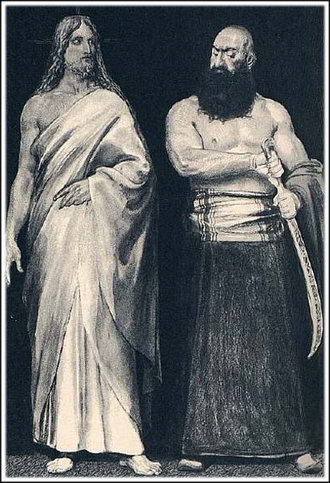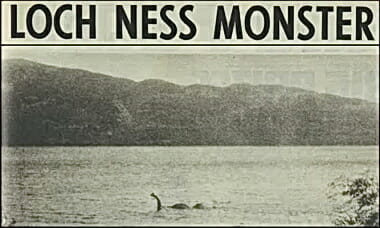“All of the nine founders of religion, with the exception of Jesus Christ, are reported in their respective sacred scriptures as having passed through a preliminary period of uncertainty, or of searching for religious light. All the founders of the non-Christian religions evinced inconsistencies in their personal character; some of them altered their practical policies under change of circumstances. Jesus Christ alone is reported as having had a consistent God-consciousness, a consistent character himself, and a consistent program for his religion.”
Robert Hume, The World’s Living Religions (New York, NY: Charles Scribner’s Sons, 1959), 285-286.
SEE MY PDF: “MUHAMMAD vs. JESUS“
MUHAMMAD
MUHAMMAD – Ordered his followers, as well as personally participating in, both digging their graves and cutting the throats of between 600-to-900 men, women, and children. Jews. Some of the women and children were taken as property. He was a military tactician that lied and told others to use deception that ultimately led to the death of many people (taqiyya): The word “Taqiyya” literally means: “Concealing, precaution, guarding.”
- In the West, what is said and done more or less corresponds to the intentions of the speaker and the doer. Liars and cheats abound, of course, but generally they can go only so far before being caught out in the contractual relationships of their society. Lying and cheating in the Arab world is not really a moral matter but a method of safeguarding honor and status, avoiding shame, and at all times exploiting possibilities, for those with the wits for it, deftly and expeditiously to convert shame into honor on their own account, and vice versa for their opponents. If honor so demands, lies and cheating may become absolute imperatives. In Shia practice, a man is allowed what is called “precautionary dissimulation,” a recognition that truth may be impossible in some contexts.
- Pierre Bourdieu, the French social anthropologist, has pointed out that no dishonor attaches to such primary transactions as selling short weight, deceiving anyone about quality, quantity or kind of goods, cheating at gambling, and bearing false witness. The doer of these things is merely quicker off the mark than the next fellow; owing him nothing, he is not to be blamed for taking what he can.[1]
Islamic ethics include deceiving the Kafir. The doctrine of deception is found in the Sunna and the Koran. The Arabic name for sacred deception is called taqiyya.
We never see any depictions of Muhammad with children, we just know that he most likely acquired a child bride at age six and consummated that “marriage” when she was nine[2] — he was a pedophile in other words. While the Qu’ran states that a follower of this book should have no more than 4 wives, we know of course that he had many more, about 5 more in fact. And “Just War Theory” cannot apply to Muhammad and Muslim’s since when he said:
“I have been ordered by Allah to fight against people until they testify that none has the right to be worshipped but Allah and that Muhammad is Allah’s Apostle and offer prayers perfectly and give the obligatory charity…then they will save their lives and property from me” (Sahih Muslim 1.24).
He ordered his followers to raid caravans, “This is the caravan of the Quraysh possessing wealth. It is likely that Allah may give it to you as booty.”[3] As he was dying, he said these now famous words, “I have been made victorious with terror.”[4]
Many more examples could be provided! Even when it comes to “salvation,” the most ardent/obedient Muslim still leaves his or her entrance into “heaven” is, in the end, an impersonal act of arbitrary divine power.… no story of love and sacrifice or assurance is provided.
[1] David Pryce-Jones, The Closed Circle: An Interpretation of the Arabs (Chicago, IL: Ivan R, Dee Publishers, 2009), 4, 38.
[2] Bukhari, vol. 5, book 63, no. 3896; cf. Bukhari, vol. 7, book 67, no. 5158.
[3] Ibn Sa’d, Kitab Al-Tabaqat Al-Kabir, translated by S. Moinul Haq and H. K. Ghazanfar, vol. 2 (Kitab Bhavan, n.d.), 9.
[4] Muhammed Ibn Ismaiel Al-Bukhari, Sahih al-Bukhari: The Translation of the Meanings, translated by Muhammad M. Khan, vol. 4, bk. 56, no. 2977 (Darussalam, 1997).
I was reading through some passages in the Quran not too long ago and came across Quran chapter 79, verse 42. I immediately noticed how similar this verse in the Quran is to Mark 13:31-32 … So, I started to do some more research on who Muhammad REALLY thought he was compared to Jesus. The findings are quite shocking!
JESUS
JESUS – When Peter struck off the ear of the soldier, healed it. Christ said if his followers were of any other kingdom, they would fight to get him off the cross. He also told Peter if he lived by the sword, he would die by it.; Christ invited and used children as examples of how Jewish adults should view their faith… something culturally radical – inviting children into an inner-circle of a group of status-oriented men such as the Pharisees was unheard of. Especially saying to them their faith must be similar; Jesus, and thusly us, can access true love because the Triune God has eternally loved (The Father loves the Son, etc. ~ unlike the Unitarian God of Islam).
Love between us then has roots in our Creator… [examples]:
- my wife and I for instance, as well as family,
- the love in community/Body of Christ,
- love for our enemies, …etc…
…has eternal foundations in God; This love from God towards us has caused a Sacrifice to ensure our salvation (John 3:16-17; 5:25; 6:47). Jesus said as well that he has “spoken openly to the world… always teaching in synagogues or at the temple, where all the Jews come together. ‘I said nothing in secret’” (John 18:20). The Bible also states that God cannot lie (Numbers 23:19; Titus 1:2; Hebrews 6:18) … and Jesus is God in orthodoxy (i.e., Jesus cannot lie). The love of Christ and the relationship he offers is bar-none the center piece of our faith… something the Muslim does not have. Which is why the Church evolved because they have a point of reference in Christ to come back to. In Matthew chapter 5 we find Jesus’ teaching and commending us to the following:
THE BEATITUDES | BELIEVERS ARE SALT AND LIGHT | CHRIST FULFILLS THE LAW | MURDER BEGINS IN THE HEART | ADULTERY BEGINS IN THE HEART | DIVORCE PRACTICES CENSURED | TELL THE TRUTH | GO THE SECOND MILE | LOVE YOUR ENEMIES
Muhammad would never be able to speak of these things that Christ did in the record of Matthew. Which is why whenever given the chance I say to a Muslim I pray they emulate Jesus’ life and follow Him rather than Muhammad. I wish Muhammad had read and followed Jesus’ teachings as well.
This is a segment of a Muslim caller into the Michael Medved Show and both Mosab Yousef and Michael Medved respond. Yousef compares Christians to Muhammad, the caller compares Muslims to Christians:
AQUINAS THOUGHTS ON MUHAMMAD
St. Thomas Aquinas is one of the most prolific thinkers in Western history; his words should not be taken lightly, regardless of your cultural/religious background. Subscribe now to stay updated with excellent content.
BREITBART has a neat story about Aquinas and his views on Islam… here is a portion of it:
…In one of his most significant works, the voluminous Summa contra gentiles, which Aquinas wrote between 1258 and 1264 AD, the scholar argued for the truth of Christianity against other belief systems, including Islam.
Aquinas contrasts the spread of Christianity with that of Islam, arguing that much of Christianity’s early success stemmed from widespread belief in the miracles of Jesus, whereas the spread of Islam was worked through the promise of sensual pleasures and the violence of the sword.
Mohammad, Aquinas wrote, “seduced the people by promises of carnal pleasure to which the concupiscence of the flesh goads us. His teaching also contained precepts that were in conformity with his promises, and he gave free rein to carnal pleasure.”
Such an offer, Aquinas contended, appealed to a certain type of person of limited virtue and wisdom.
“In all this, as is not unexpected, he was obeyed by carnal men,” he wrote. “As for proofs of the truth of his doctrine, he brought forward only such as could be grasped by the natural ability of anyone with a very modest wisdom. Indeed, the truths that he taught he mingled with many fables and with doctrines of the greatest falsity.”
Because of the weakness of Islam’s contentions, Aquinas argued, “no wise men, men trained in things divine and human, believed in him from the beginning.” Instead, those who believed in him “were brutal men and desert wanderers, utterly ignorant of all divine teaching, through whose numbers Muhammad forced others to become his followers by the violence of his arms.”
Islam’s violent methods of propagation were especially unconvincing to Aquinas, since he found that the use of such force does not prove the truth of one’s claims, and are the means typically used by evil men.
“Mohammad said that he was sent in the power of his arms,” Aquinas wrote, “which are signs not lacking even to robbers and tyrants.”
At the time Aquinas was writing, Islam was generally considered a Christian heresy, since it drew so heavily on Christian texts and beliefs. Aquinas wrote that Mohammed “perverts almost all the testimonies of the Old and New Testaments by making them into fabrications of his own, as can be seen by anyone who examines his law.”
According to the noted historian Hilaire Belloc, Islam “began as a heresy, not as a new religion. It was not a pagan contrast with the Church; it was not an alien enemy. It was a perversion of Christian doctrine. Its vitality and endurance soon gave it the appearance of a new religion, but those who were contemporary with its rise saw it for what it was—not a denial, but an adaptation and a misuse, of the Christian thing.”…
MUCH MORE
Here are some ways to deal with Muslim apologists questioning Jesus’ Divinity:
(Above) Nabeel Qureshi, a former Muslim, answers a question from a faithful Muslim about how Jesus could have both a Divine (God) nature and a human nature without confusion or contradiction. See more from Nabeel HERE (He has passed away)
Nabeel is battling stomach cancer, so any prayers would be a gracious help.
Here is a more in-depth presentation dealing with how the question is typically raised.
Muslims around the world are being trained to ask Christians, “Where did Jesus say, ‘I am God, worship me,’ in those exact words?” However, if Muslims are suggesting that Jesus could only claim to be God by uttering a specific sentence, we may reply by asking, “Where did Jesus say, ‘I am only a prophet, don’t worship me,’ in those exact words?” The unreasonable demand for a particular statement, if applied consistently, would thus force Muslims to reject their own view!
Fortunately, we have a simple way to examine what Jesus said about himself. According to both the Bible and the Qur’an, there are certain claims that only God can truly make. For instance, God alone can correctly state that he created the universe. Of course, a mere human being can pronounce the words, “I created the universe,” but the statement would be false coming from anyone other than God.
Hence, if Jesus said things that can only truly be said by God, we must conclude that Jesus claimed to be God. Interestingly, Jews, Christians, and Muslims agree on many of the claims that cannot be properly made by (or about) mere human beings. In this video, we consider several examples of such claims.
For more on the deity of Christ, watch these videos by David Wood:
Among the major differences between Islam and Christianity is that of the character and nature of God as understood by the Bible and the Qur’an. For the Bible, Yahweh is a relational God, a God who appears to his people throughout the Old Testament, who took on flesh in the incarnation of Jesus Christ in the New Testament, and who will be present, the Bible claims, in heaven with us once again: “For now we see through a glass, darkly,” wrote the apostle Paul; “but then face to face.” [76] This is very different from Allah in the Qur’an, a God who is distant and remote, transcendent and lofty, who does not deign to step down into his creation, and is not present in Paradise. As Muslim theologian Isma’il al Faruqi writes:
Allah does not reveal Himself to anyone in any way. Allah reveals only his will… Allah does not reveal himself to anyone… that is the great difference between Christianity and Islam.[77]
Central, too, to the Christian understanding of God is that Yahweh is loving; indeed, the Bible goes as far as to boldly make the claim that God is love,[78] the one whose character and nature define what love actually is. You will commonly hear people opine that all religions teach that God is love, but this is simply not true – for instance, nowhere does the Qur’an claim that “Allah is love.”[79]
Finally, at the heart of Christianity stands the belief that, in Jesus, God has experienced suffering, paying the price of the cross in order to reconcile humanity to himself. Now atheists may choose to dismiss, laugh at, or even scoff at that claim, but it is a claim unique to Christianity.[80] It is certainly not an idea found in Islam, where the Qur’an goes as far as to deny that the historical event of Jesus’ crucifixion ever happened.
It has long fascinated me that when Christianity talks about the cross and the suffering of God, it is doing something quite startling, namely reversing the traffic pattern of every other religion, world view, and belief system. All other religions of which I am aware tend to work in one of three basic ways: they claim that if you know the right things, do the right things, or experience the right things, then you will achieve paradise, nirvana, wisdom, a higher state of consciousness, good teeth — whatever it is you are looking for. Islam adopts this model (“Keep the commandments”), as does, incidentally, the New Atheism, whose message is that if you think the right way — think good, secular, scientific thoughts — you’ll be one of the smart ones, one of the brights,[81] one of the elite, the elect.
[76] 1 Corinthians 13:12 (KJV).
[77] Isma’il al Faruqi, Christian Mission and Islamic Da’wah: Proceedings of the Chambésy Dialogue Consultation, Leicester: The Islamic Foundation, 1982, pp. 47-48.
[78] 1 John 4:16.
[79] And many Muslim theologians argue that Muslims should not use the word “love” when talking about Allah; see e.g. Murad Wilfried Hofmann, “Differences between the Muslim and the Christian Concept of Divine Love” in 14th General Conference of the Royal Aal al-Bayt Institute for Islamic Thought, Amman, Jordan, 2007. See also Gordon Nickel, “The Language of Love in Qur’an and Gospel” in Juan Pedro Monferrer-Sala and Angel Urban, (eds), Sacred Text: Explorations in Lexicography, Frankfurt: Peter Lang, 2009, pp. 223-248.
[80] If you wish to understand this idea (which, whatever you make of it, is the central claim at the heart of Christianity), a great place to start is John Stott, The Cross of Christ, Leicester: IVP, 2006.
[81] A nauseatingly self-congratulatory term coined by some of the New Atheists to mark themselves off from the rest of the world, whom they clearly perceive as dimwits. See Daniel Dennett, “The Bright Stuff“, The New York Times, 12 July 2003.
Andy Banister, The Atheist Who Didn’t Exist: Or, The Dreadful Consequences of Bad Arguments (Oxford, England: Monarch Books, 2015), 62-63.
I am not a fan of the show… I think it is borderline blasphemous; but was listening to him (Neil Saavedra, AKA, “Jesus Christ”) on the way to get coffee for the wife and I while we were watching the niece. I enjoyed the call. I may start listening and uploading stuff like it in the future. BUT KNOW that a dude who responds like Jesus, is, …well… creepy and again ~ borderline blasphemous in my mind.
“Muhammad” Talks to “Jesus Christ”
I am not a fan of the show… I think it is borderline blasphemous; but was listening to him (Neil Saavedra, AKA, “Jesus Christ”) on the way to get coffee for the wife and I while we were watching the niece. I enjoyed the call. I may start listening and uploading stuff like it in the future. BUT KNOW that a dude who responds like Jesus, is, …well… creepy and again ~ borderline blasphemous in my mind.





